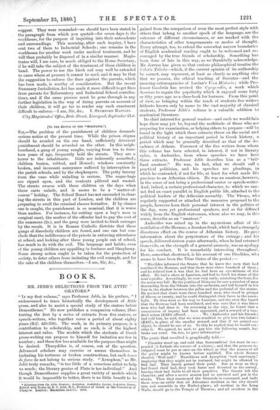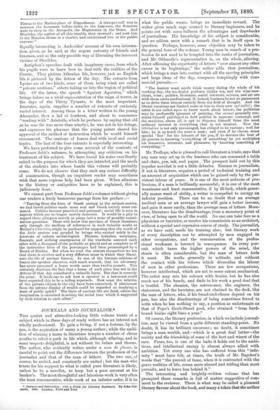BOOKS.
MR. JEBB'S SELECTIONS FROM THE ATTIC ORATORS.* " IN my first volume," says Professor Jebb, in his preface, " I endeavoured to trace historically the development of Attic prose, and also to assist a special study of the orators before Demosthenes." He now publishes a companion volume, illus- trating the first by a series of extracts from five orators, or speech-writers, who together cover a period of about eighty years (B.C. 420-338). The work, in its primary purpose, is a contribution to scholarship, and as such, is of the highest interest and value. The models which the students of Greek prose-writing can propose to himself for imitation are few in number ; and these few less available for the purpose than might be desired. Thucydides is, of course, out of the question. Advanced scholars may exercise or amuse themselves in imitating his tortuous or broken constructions, but such tours de force do not belong to serious study. " Xenophon," as Mr. Jebb truly remarks, "is too little of a conscious artist to help us much ; the literary genius of Plato is too individual." And though Demosthenes supplies a great variety of models which it would be impossible to better, there is no little benefit to be
• Selections from the Attie Orators: Antiphon, Andokides, Lysias, Isokraies, !soros. Edited, with Notes, by B. C. Jebb, M.A.. Professor of Greek in the University of Glamr.w. Loudon : Macmillan and Co. 1880.
gained from the comparison of even the most perfect style with 'others that belong to another epoch of the language, are the outcome of different circumstances, or are marked with the characteristics of other temperaments or modes of thought.
Every attempt, too, to extend the somewhat narrow boundaries of English academical reading ought to be welcomed and en-
couraged by the true friends of scholarship. Something has been done of late in this way, as we thankfully acknowledge. Mr. Jerram has given us that curious philosophical treatise the Cebetis Tabula—which, if the current opinion of its authorship be correct, may represent, at least as closely as anything else that we possess, the ethical teaching of Socrates—and the amusing extravagancies of Lucian's Vera Historia ; while Pro-
fessor Goodwin has revived the Cyroptedia, a work which deserves to regain the popularity which it enjoyed some forty or fifty years ago as a class-book for learners. From this point of view, as bringing within the reach of students five writers hitherto known only by name to the vast majority of classical students, Professor Jebb's volume is a valuable addition to academical literature.
Its chief interest for general readers—and such we would fain hope there may yet be, beyond the multitude of those who are preparing for examination, or helping others to prepare—will be found in the light which these extracts throw on the social and political history of an important period in Greek history, a period which may be generally described as that of the de- cadence of Athens. Foremost of the five writers from whom this volume has been selected, in interest, if not in literary value, is Andocides, from whose speeches we have here three extracts. Professor Jebb describes hint as a " bril- liant amateur." He was, iu fact, what we should call a practical politician, and his speeches arc pleadings, in which he contended, if not for life, at least for what made life precious to an Athenian citizen. He was an amateur, however, in the sense of not being a professional orator or speech-writer. And, indeed, a certain professional character, to which we can-
not find an exact parallel in English public life, attached to the political leaders of the Athenian assembly. The 'Piropts, who regularly supported or attacked the measures proposed to the
people, however keen their personal interest in the politics of the day, were yet professional speakers, and so far differed widely from the English statesman, whom also we may, in this sense, describe as an " amateur."
Andocides was mixed up in the mysterious affair of the mutilation of the Hermae, a drunken freak, which had a strangely disastrous effect on the course of Athenian history. He gave information about the perpetrators of the outrage ; and his speech, delivered sixteen years afterwards, when he had returned from exile, on the strength of a general amnesty, was an apology for his conduct. It is remarkably interesting throughout. Here, somewhat shortened, is his account of one Dioclides, who seems to have been the Titus Oates of the period :-
"Dioclides informed the Senate that ho know the men that had mutilated the Hermae, and that there were three hundred of them ; and he related how it was that ho had been an eye-witness of the affair. He had a slave at Laurium, and had to fetch his share of the man's profits. Accordingly, he rose very early, mistaking the hour, for the moon was full. By the portico of Dionysus he saw a number of men descending from the Odeum into the orchestra, and hid himself in his fear in the shadow between the pillar and the pedestal of the statue. He noticed that there were three hundred men, who stood in groups of fifteen or twenty, and he could distinguish their faces in the moon- light. He then went on his way to Laurium, and the next day heard that the Hermae had been mutilated, and was sure that it was these men who had done it. On returning to the city, he found that a commission of inquiry had been appointed, and a reward of a hun-
dred minas (X420) offered We [Andocides and his friends] had told him, he said, that we were resolved to give him two talents (2487), in place of the smaller reward, and that if we gained our object, he should be one of us. To this he replied that he would cot- sitter it. We agreed, ho said, to pay him the following month, but broke our word. On this, he gave information."
The panic that resulted is graphically told :-
" Pisander stood up, and said that Scamandrius' Act must be sue- pended [it forbade the torture of a citizen], and that the persons in- culpated must be put at once on the wheel, so that the names of all the guilty might be known before nightfall. The whole Senate shouted, Well said !' Mantitheus and Apsephion ' took sanctuary,' imploring that they might not be tortured, but might be allowed to find bail. They barely gained their point. But as soon as they had found their bail, they took horse and deserted to the enemy,, leaving their bail liable to all their penalties. The Senate left the chamber, and after a secret session had us arrested and put in the stocks. Then they summoned the Generals in command, and bade them issue an order that all Athenians resident in the city should arm and assemble in the Market-place ; all resident in the Long Walls, should go to the Temple of Theseus; and all resident in the
Piramis to the Market-place of Hippodamus. A trumpet-call was to summon the horsemen before dawn to the Anaceum, the Senators were to sleep in the Acropolis, the Magistrates in the Dome. And Dioclides, the author of all this trouble, they crowned ; and took him to the Mansion House in a chariot, and entertained him at the public expense."
Equally interesting is Andccides' account of his own informa- tion, given, as he said, at the urgent entreaty of friends and kinsmen, and as the only possible way of liberating the innocent victims of Dioclides.
Antiphon's speeches dealt with imaginary cases, from which his pupils were to learn how to deal with the realities of the Courts. They picture Athenian life, however, just as English life is pictured by the fiction of the day. The extracts from Lysias are of two kinds, some of them being what are called " private orations," others taking us into the region of political life. Of the latter, the speech " Against Agoratus," which brings before us a vivid representation of the reign of terror, in the days of the Thirty Tyrants, is the most important.
Isocrates, again, supplies a number of extracts of curiously varied interest. Among them is a letter written to the young Alexander, then a lad of fourteen, and about to commence "reading with" Aristotle, which he prefaces by saying that old as he was (lie was more than ninety), he was not in his dotage, and expresses his pleasure that the young prince shared his approval of the method of instruction which he would himself recommend. The orations of Isaeos deal with local and social topics. The last of the four extracts is especially interesting.
We have preferred to give some account of the contents of Professor Jebb's volumes, to attempting any criticism on his treatment of his subject. We have found his notes excellently suited to the purpose for which they are intended, and the needs of the students into whose hands this volume will probably come. We do not observe that they omit any serious difficulty of construction, though an impatient reader may sometimes wish that more copious help had been given. When allusions to the history or antiquities have to be explained, this is judiciously done.
We cannot part from Professor Jebb's volumes without giving
our readers a finely humorous passage from his preface :— " Turning from the form of Greek oratory to the subject-matter, we find Greek politics made more real and Greek society more ani- mated. Politics become practical and personal ; social life is seen in aspects which are no longer merely domestic. It would be a pity to regard these glimpses merely as peeps into a mine of possible exami- nation-questions. Those who know this province of Greek literature only through the medium of references in such valuable works as Becker's Charicles, might be pardoned for supposing that the world of the Attic orators was peopled by beings who existed solely in the interests of unborn archmologists. Dinners, kottabos, marriages, funerals, and striking emergencies of the wardrobe succeed each other with a disregard of the probable as placid and as complete as if the instructive lives of the personages had been prearranged by a Board of Studies. But when we read the orators themselves we see that there is another and a very different sense in which they illumi- nate the life of ancient Greece. In one of tho forensic orations of Isaeos the speaker observes, with much warmth, that his adversary has never possessed a horse worth more than twelve pounds. This certainly discloses the fact that a horse of such price was not in the Athens'of that day considered a valuable horse. But that is scarcely
the point. It leads one to ask how a speaker in a law-court could have expected this to be a telling reproach. How must the relation of the private citizen to the city have been conceived, if abstinence from the private display of wealth could be regarded as implying a want of public spirit ? The facts of ancient life are dead, unless the imagination is exercised in seizing the social tone which is suggested by their relation to each other."



































 Previous page
Previous page